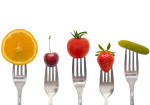|
2002/10/07, 01:08 PM
hi everyone,i wanted to know what is a good vegetarian diet for gaining mass.I also wanted to know how much time does it take till u actually see changes in you.Thanks alot if anyone can help......
|
|
|
|
2002/10/07, 01:18 PM
how much of a veg r u? are u a total vegan, or just no red meat, etc...?
--------------
Michael
"Trample the weak; hurdle the dead!"
|
|
2002/10/07, 01:54 PM
Hi rev,I eat eggs and all veg...no mean,no fish..etc...only eggs and veg.....so i really needed a good vegetarian diet to increase my weight...I started bodybuilding 3 weeks back and i am following the exercise plan from this site and it is great!!..but i am just scared that i don't loose weight instead of gaining...I am 5'9" and 61kgs in weight...Can u help??..Thanks......
|
|
2002/10/07, 05:51 PM
What about dairy products? That and the variety of soy products available should help you out tremendously. Also, don't forget your beans, nuts, and maybe a protein powder.
|
|
2002/10/07, 09:13 PM
You are going to need protein powder supplementation,no doubt about it! take mass amino acids with each and every meal. This is a must in your situation even moreso. At least 4 with each meal. If you can do eggs, then that is a major plus. You will need lots of them to make up for animal proteins. That is where the aminos come in.
|
|
2002/10/08, 01:19 AM
Hi,
protien is important, eggs, beans and low fat diary products will do..
carbs: rice veg noodles
|
|
2002/10/08, 08:51 AM
Thanks guys...i am using soya beans now with milk and oat meal...so i guess i should make up for the non-veg...I never knew this site was so active!!..The exercises are really great..and the people are really helpful..I have never seen any other site so active..Thanks guys!!..
|
|
2002/10/08, 11:50 AM
since you're not a total vegan, then definitely go with lots of eggs, dairy, etc. keep an eye on taking in a sufficient amount of B12; it can suffer dramatically in a vegan diet. as far as powders and aminos go: most are made from animal sources, so make sure you check your labels. just try to stick with real, whole foods first, then supplement as necessary from there.
--------------
Michael
"Trample the weak; hurdle the dead!"
|
|
2002/10/08, 02:00 PM
Everyone else has pretty much answered your question but here's a "grain" a lot of people don't know about so I thought I'd mention it here... again. :) You can buy quinoa in natural groceries and add it to soups, salads, or use it like you'd use brown rice or couscous. It has a fairly strong flavor; some people like it, some don't.
"This Mother Grain of the Incas has been grown in the Andes of South America for centuries. Quinoa is a small seed about the size of millet. It is very high in protein and is closer to the United Nation's FAO ideal balance for amino acids than any other common cereal grain. Quinoa is high in essential amino acids: lysine, methionine, and cystine, which are particularly important for vegetarian diets and in correcting deficiencies in legume diets. Quinoa is high in calcium, phosphorus, iron, vitamin E and some of the B vitamins. Colorado-grown Quinoa has a rich, delicate, nutty taste and can be substituted for nearly any grain in almost any recipe."
Another thing you can do is sub soy powder (not soy flour; soy powder is a smooth protein isolate that needs refrigeration; you should be able to buy it in bulk at a natural grocery) for flour, up to a third or one half in most recipes.
|









